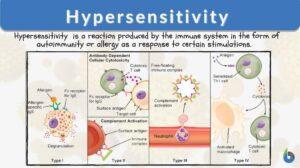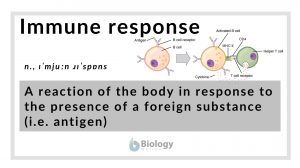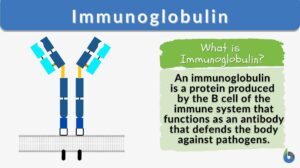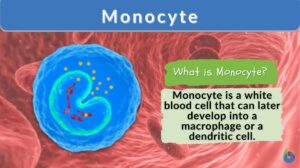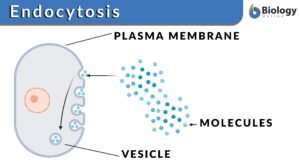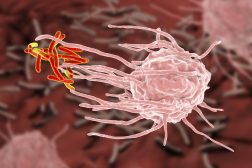Search Results for: antigen
Humoral immunity
Let’s get to know where one should place humoral immunity, the topic of today’s discussion!! By the end of the article,... Read More
Exogenous antigen
Definition noun Antigen that enters the body of the organism from the outside, e.g. through inhalation, ingestion, or... Read More
Antigen-antibody complex
Antigen-antibody complex The complex formed by the binding of antigen and antibody molecules. The deposition of large... Read More
Heterogenetic antigen
Heterogenetic antigen An antigen which is possessed by a variety of different phylogenetically unrelated species; e.g., the... Read More
Hypersensitivity
Hypersensitivity Definition Hypersensitivity is the exaggerated immune response to protect the human from foreign bodies... Read More
Flagellar antigen
Flagellar antigen The heat-labile antigens associated with bacterial flagella, in contrast to somatic antigen. See: h... Read More
Soluble antigen
soluble antigen viral antigen that remains in solution after the particles of virus have been removed by means of... Read More
Immune response
Immune Response Definition An immune response is defined as the reaction of the body in response to the presence of a... Read More
Autoantigen
Definition noun, plural: autoantigens An endogenous antigen that is recognized as nonself by the immune system, which should... Read More
Antigenic variation
Definition noun, plural: antigenic variations (immunology) The changing of surface proteins by an infectious agent to evade... Read More
Self antigen
Definition noun, plural: self antigens An exogenous antigen that is recognized as nonself by the immune system, which should... Read More
Immunoglobulin
Immunoglobulin Definition An immunoglobulin is a globulin molecule produced by the immune cells, for the body's defense... Read More
Antigenicity
Definition noun (1) The capacity of a molecule or an antigen to induce an immune response, that is to be recognized by and... Read More
Passive agglutination
Definition noun An agglutination reaction of inert particles coated with soluble antigen through an antiserum specific for... Read More
Fluid mosaic model
Fluid Mosaic Model Definition What is the fluid mosaic model? The fluid mosaic model is a three-dimensional representation... Read More
Opsonization
Definition noun, plural: opsonizations The process at which opsonins bind to the surface of the antigen so that the... Read More
Memory B cell
Definition noun, plural: memory B cells A small, long-lived B lymphocyte that was previously exposed to a particular... Read More
Plasmablast
Definition noun, plural: plasmablasts An antibody-producing stem cell that could give rise to another of its kind or... Read More
Endocytosis
Endocytosis Definition What is endocytosis in biology? Endocytosis is a cellular process by which a cell internalizes any... Read More
Radial immunodiffusion
Definition noun A quantitative immunodiffusion technique used to detect the level of protein (antigen) in a sample by... Read More
Biological Cell Defense
Organisms must find a means of defense against antigens such a viruses described on the previous tutorial. If this was not... Read More
Complement fixation test
Definition noun (immunology) A form of immunological test for the detection of the presence of either a particular antibody... Read More
Active agglutination
Definition noun An agglutination reaction in which the antigen is found naturally on particle Supplement Agglutination... Read More
Reverse passive agglutination
Definition noun A type of agglutination reaction in which known antibody is bound to a carrier particle instead of the... Read More
Codominance
Codominance Definition Codominance is a form of inheritance wherein the alleles of a gene pair in a heterozygote are fully... Read More
T-helper cell
Definition noun, plural: T-helper cells A type of T lymphocyte that assists by activating antigen-presenting leukocytes,... Read More
Phagocytosis
Phagocytosis Definition Phagocytosis is a basic physiological cellular process wherein a cell ingests a solid particle... Read More
Memory cell
Definition noun, plural: memory cells A long-lived immune cell that has the ability to recognize a foreign particle that it... Read More
Plasma B cell
Definition noun, plural: plasma B cells A large B lymphocyte that when exposed to antigen, produce, and secrete large... Read More



